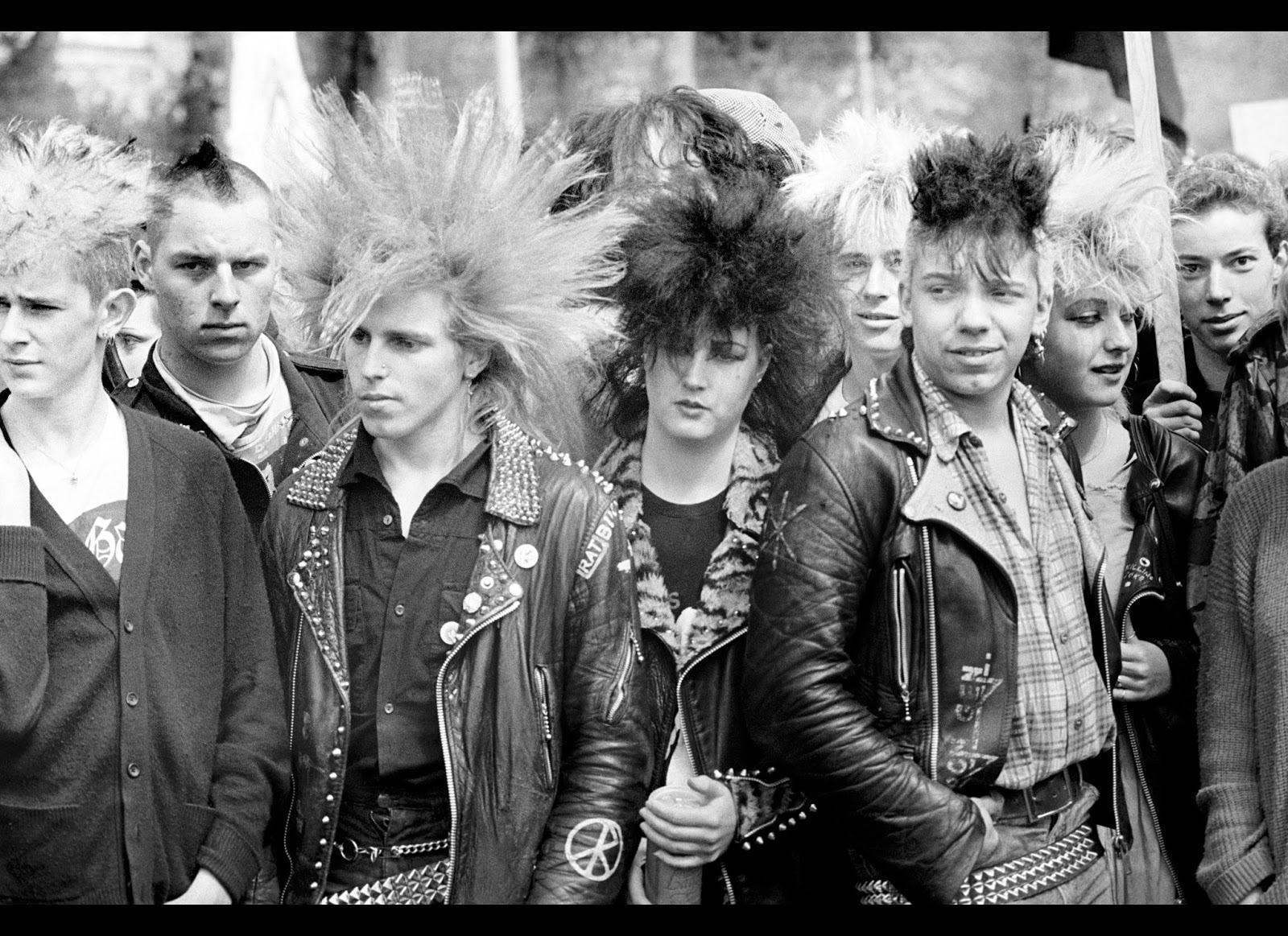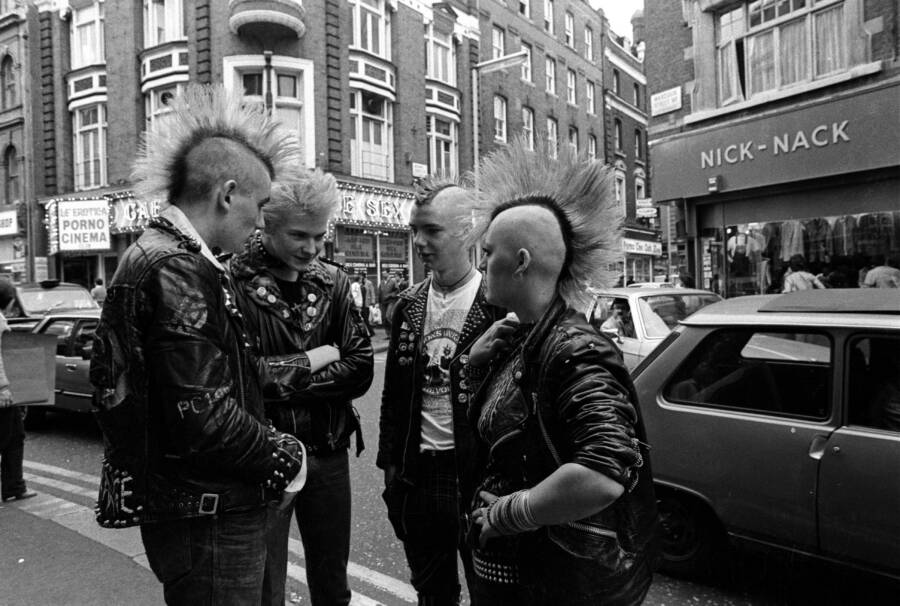What is 1970's punk rock?
1970's punk rock is a genre of rock music that emerged in the mid-1970s, characterized by its raw, aggressive sound, and anti-establishment lyrics.
It is often associated with the rise of the punk subculture, which rejected the mainstream values and aesthetics of the time.
Punk rock has had a significant influence on popular culture, and continues to be a popular genre of music today.
Some of the most famous punk rock bands include the Ramones, the Sex Pistols, and the Clash.
1970's punk rock
1970's punk rock was a genre of rock music that emerged in the mid-1970s, characterized by its raw, aggressive sound, and anti-establishment lyrics. It is often associated with the rise of the punk subculture, which rejected the mainstream values and aesthetics of the time. Punk rock has had a significant influence on popular culture, and continues to be a popular genre of music today.
- Origins: Punk rock emerged in the mid-1970s, influenced by garage rock, proto-punk, and other genres.
- Characteristics: Punk rock is characterized by its raw, aggressive sound, often featuring distorted guitars, fast tempos, and shouted vocals.
- Lyrics: Punk rock lyrics often express anti-establishment views, social commentary, and personal angst.
- Fashion: Punk rockers often adopt a distinctive fashion style, which may include ripped clothing, safety pins, and mohawks.
- Influence: Punk rock has had a significant influence on popular culture, inspiring many other genres of music and fashion.
- Legacy: Punk rock continues to be a popular genre of music today, with many bands and fans around the world.
Some of the most famous punk rock bands include the Ramones, the Sex Pistols, and the Clash. These bands helped to define the sound and style of punk rock, and their music continues to inspire fans today.
Origins
Punk rock emerged in the mid-1970s as a reaction to the mainstream rock music of the time, which was seen as being too polished and commercial. Punk rockers sought to create a new kind of music that was raw, aggressive, and anti-establishment. They were influenced by a variety of genres, including garage rock, proto-punk, and other underground music.
Garage rock is a genre of rock music that emerged in the mid-1960s. It is characterized by its raw, distorted sound, and often features simple, repetitive lyrics. Proto-punk is a genre of rock music that emerged in the late 1960s and early 1970s. It is characterized by its aggressive sound and anti-establishment lyrics, and is often seen as a precursor to punk rock.
The influence of garage rock and proto-punk on punk rock can be heard in the raw, aggressive sound of punk rock music. Punk rock lyrics also often express anti-establishment views, and many punk rockers adopted a distinctive fashion style that was influenced by the garage rock and proto-punk scenes.
The connection between the origins of punk rock and 1970's punk rock is important because it helps us to understand the development of punk rock as a genre. Punk rock emerged as a reaction to the mainstream rock music of the time, and it was influenced by a variety of genres, including garage rock, proto-punk, and other underground music. This connection helps us to understand the unique sound and style of punk rock, and its importance as a genre of music.
Characteristics
The characteristics of punk rock music are essential to understanding its significance in the context of 1970's punk rock.
- Raw and aggressive sound: Punk rock is characterized by its raw and aggressive sound, which is often achieved through the use of distorted guitars, fast tempos, and shouted vocals. This sound is a rejection of the polished and commercial sound of mainstream rock music of the time.
- Distorted guitars: The use of distorted guitars is a key element of the punk rock sound. Distortion creates a raw and aggressive sound that is often associated with anger and rebellion.
- Fast tempos: Punk rock songs often have fast tempos, which contribute to the music's aggressive and energetic feel. Fast tempos are often used to create a sense of urgency and excitement.
- Shouted vocals: Punk rock vocals are often shouted or screamed, which adds to the music's raw and aggressive sound. Shouted vocals are often used to express anger, frustration, and other strong emotions.
These characteristics of punk rock music are essential to understanding its significance in the context of 1970's punk rock. Punk rock was a rejection of the mainstream rock music of the time, and its raw and aggressive sound was a reflection of the anger and frustration of the youth of the time.
Lyrics
The lyrics of punk rock songs often express anti-establishment views, social commentary, and personal angst. This is a key component of punk rock, and it is what sets it apart from other genres of rock music.
Punk rock lyrics often deal with topics such as poverty, unemployment, government oppression, and social injustice. Punk rockers often use their music to express their anger and frustration with the world around them. They also use their music to challenge the status quo and to promote social change.
The connection between punk rock lyrics and 1970's punk rock is important because it helps us to understand the significance of punk rock as a genre of music. Punk rock was a reaction to the social and political climate of the 1970s. It was a way for young people to express their anger and frustration with the world around them.
Punk rock lyrics are an important part of the genre. They are what set punk rock apart from other genres of rock music. Punk rock lyrics are a powerful tool for social commentary and change.
Fashion
The distinctive fashion style of punk rockers is an integral part of the 1970's punk rock movement. It is a way for punks to express their individuality and their rejection of mainstream society.
- Ripped clothing: Ripped clothing is a common element of punk fashion. It is often seen as a symbol of rebellion and nonconformity.
- Safety pins: Safety pins are another common element of punk fashion. They are often used to hold together ripped clothing or to create a more edgy look.
- Mohawks: Mohawks are a type of hairstyle that is often associated with punk rockers. They are typically created by shaving the sides of the head and leaving a strip of hair in the middle.
The fashion style of punk rockers is a way for them to express their individuality and their rejection of mainstream society. It is a powerful form of self-expression that has had a significant impact on popular culture.
Influence
Punk rock has had a significant influence on popular culture, inspiring many other genres of music and fashion. This is due to its raw energy, rebellious attitude, and DIY ethos. Punk rock has helped to shape the sound of many other genres, including grunge, alternative rock, and pop punk.
The influence of punk rock on fashion is also undeniable. Punk rockers have adopted a distinctive fashion style that includes ripped clothing, safety pins, and mohawks. This style has been adopted by many other subcultures, including the goth and emo subcultures.
The connection between the influence of punk rock and 1970's punk rock is important because it helps us to understand the significance of punk rock as a genre of music and culture. Punk rock was a major force in shaping the culture of the 1970s, and its influence can still be seen today.
The influence of punk rock is a reminder that music can be a powerful force for change. Punk rock helped to change the face of popular culture, and it continues to inspire people around the world.
Legacy
The legacy of 1970's punk rock is evident in the continued popularity of the genre today. Punk rock bands continue to tour and release new music, and there is a large and dedicated fan base for the genre. This is due in part to the raw energy, rebellious attitude, and DIY ethos of punk rock, which continue to resonate with people around the world.
The legacy of punk rock is also evident in the influence it has had on other genres of music. Punk rock has helped to shape the sound of many other genres, including grunge, alternative rock, and pop punk. This is due to the unique sound of punk rock, which is characterized by its raw energy, distorted guitars, and shouted vocals.
The connection between the legacy of punk rock and 1970's punk rock is important because it helps us to understand the significance of punk rock as a genre of music. Punk rock was a major force in shaping the culture of the 1970s, and its influence can still be seen today. The legacy of punk rock is a reminder that music can be a powerful force for change.
FAQs on 1970's punk rock
This section provides answers to frequently asked questions about the origins, characteristics, and significance of 1970's punk rock.
Question 1: What is the historical context of 1970's punk rock?
Answer: 1970's punk rock emerged as a reaction to the social and political climate of the time, characterized by economic recession, political unrest, and a sense of disillusionment among the youth. It was a form of rebellion against the mainstream and a way to express frustration and anger.
Question 2: What are the defining characteristics of 1970's punk rock music?
Answer: 1970's punk rock is characterized by its raw and aggressive sound, often featuring distorted guitars, fast tempos, and shouted vocals. The lyrics typically express anti-establishment views, social commentary, and personal angst.
Question 3: What was the fashion style associated with 1970's punk rockers?
Answer: Punk rockers adopted a distinctive fashion style that included ripped clothing, safety pins, and mohawks. This style was a form of self-expression and rebellion against societal norms.
Question 4: What is the legacy of 1970's punk rock?
Answer: 1970's punk rock has had a lasting impact on popular music and culture. It influenced the development of many other genres, including grunge, alternative rock, and pop punk. The rebellious attitude and DIY ethos of punk rock continue to inspire musicians and fans today.
Question 5: What are some notable 1970's punk rock bands?
Answer: Some of the most influential 1970's punk rock bands include the Ramones, the Sex Pistols, the Clash, the Damned, and the Buzzcocks. These bands helped to define the sound and style of punk rock and continue to be celebrated today.
Question 6: What is the significance of 1970's punk rock?
Answer: 1970's punk rock was a significant cultural movement that challenged societal norms and expressed the frustrations of a generation. It had a profound impact on music, fashion, and youth culture, and its influence continues to be felt today.
These FAQs provide a concise overview of key aspects of 1970's punk rock, offering a deeper understanding of its origins, characteristics, and lasting significance.
The next section will explore the impact of 1970's punk rock on contemporary popular music.
Conclusion
1970's punk rock emerged as a powerful countercultural movement, challenging societal norms and leaving an indelible mark on popular culture. Its raw energy, rebellious attitude, and DIY ethos continue to inspire musicians and fans alike.
The key elements of 1970's punk rock - its aggressive sound, anti-establishment lyrics, and distinctive fashion style - have had a profound impact on the development of subsequent music genres, including grunge, alternative rock, and pop punk. The legacy of punk rock lies in its ability to express the frustrations and disillusionment of a generation, while encouraging individuality and self-expression.
In conclusion, 1970's punk rock stands as a testament to the power of music as a force for social and cultural change. Its influence continues to resonate today, reminding us of the importance of challenging the status quo and embracing the spirit of rebellion.




